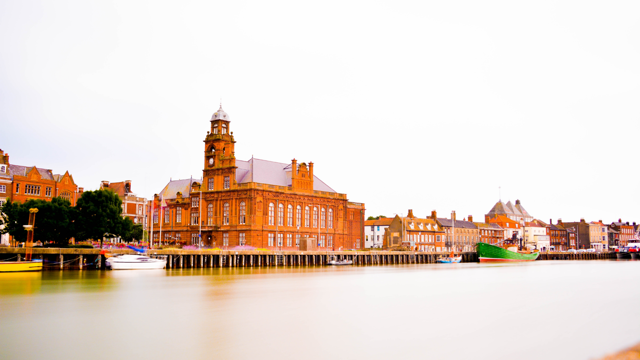
A project by Norfolk-based charity The Restoration Trust shows the hugely positive impact that connecting with history and heritage can have on our health and wellbeing.
The Restoration Trust was awarded funding from Historic England to deliver a two-year social prescribing and heritage project in Great Yarmouth, Lowestoft and Waveney.
The project involved the appointment of a Heritage Link Worker, who works with partners Access Community Trust, D.I.A.L Great Yarmouth, Primary Care Networks and local link workers to connect people to heritage activities in the area.
Sharon Martin, who was referred by a link worker in her GP surgery, describes her experience as a participant of the project:
Sharon shares her Roman coin find (c: Rob Fairclough)
“Since joining the Heritage Link Worker project I’ve achieved something which has been on my bucket list for years. I’ve been lucky enough to take part in an archaeological dig at Arminghall Henge! More importantly, I found a Roman coin! I said right from the start that my dream would be to find a Roman coin, and when it happened the moment was totally unbelievable to me. I shook with total amazement and excitement!
Our group went to Caister cemetery with the artist Dolly Sen, to learn about an unfortunate lady called Lorina Bulwer who was admitted to the Great Yarmouth workhouse in the late 19th Century. Some of her embroidery is in the Norwich Castle Museum. This was very interesting and a little emotional.
I’ve also joined Time Travellers, a local history group at the library. It was here that I met my good friend Heather. We have met up outside of the group and spent hours talking about one thing and another.
Before I got involved with these groups, I was very depressed. Things were piling up, one thing after another. Being a part of these groups that involve my total favourite subjects and meeting like-minded people, has really, totally, helped me. Meeting new people and experiencing new things is brilliant!”
Another group member, referred through Access Community Trust, shares their experience of joining the heritage group:
“In recent months I have been attending the heritage groups led by the Heritage Link worker, Emily Cannell, from the Restoration Trust. The sessions provide a chance to meet a diverse group of people with a shared interest in finding out more about the past.
The activities are varied and the facilitator, Emily, is skilled at supporting people to engage in a way that meets their needs. Each session has a specific focus, bringing local heritage to life.
The sessions work wonders for my mental health, helping me to be grounded in the moment. They help me to forge connections with others and with the place in which I live. Reflecting on the lives and struggles of those in times gone by helps to put my own issues into context.
The sessions inspire and encourage creative responses and allows me to express myself. I particularly enjoy the outdoor sessions which explore the built environment or those where we delve into the lives of individuals with fascinating stories.
Emily engages local experts to provide detailed knowledge of specific places, people or events who seem only too happy to share their expertise and answer questions. The group sessions are relaxed and informal, filled with chatter and laughter, and usually fuelled by tea and biscuits!
Through attending the sessions I have been inspired to write poetry and create artworks which are quickly becoming passions of mine. The groups have helped me immensely at a time when I was lost to find myself again and build confidence in projecting myself into the world.”
At NASP, we work with our partner Historic England to develop social prescribing projects that use heritage and history to support people’s health and wellbeing. Historic England published their Wellbeing and Heritage Strategy in May, and funds voluntary sector organisations as part of their work on social prescribing.


